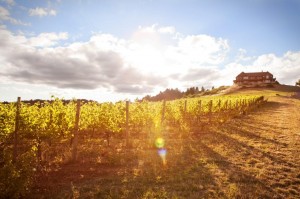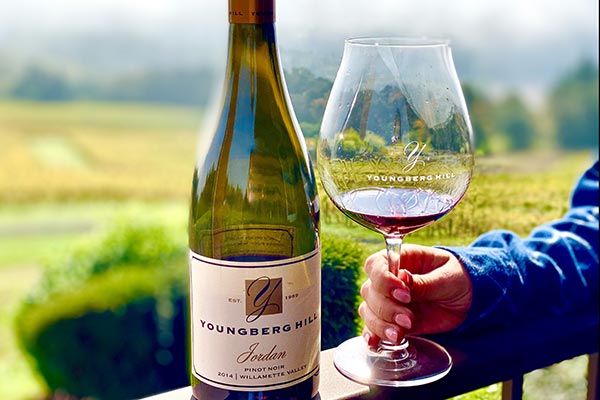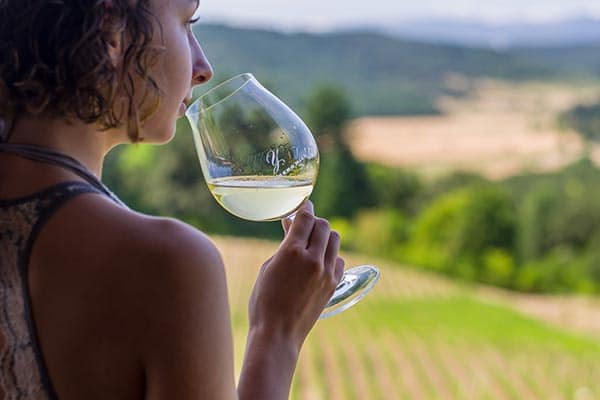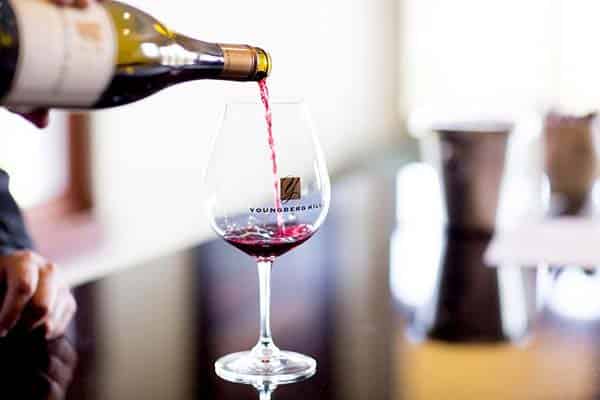Pinot Noir grapes are grown around the world and remain a difficult variety to cultivate and transform into wine. The grape is chiefly associated with the Burgundy region of France and in more recent years, The Willamette Valley of Oregon. Willamette Valley is at the same latitude as Burgundy, and has a similar cool, damp climate in which the finicky Pinot Noir grapes thrive. Both regions are widely considered to produce some of the finest wines in the world.
Oregon Pinot Noirs are the ultimate food wine – complex, sleek, smooth and elegant with moderate degrees of tannin (the substance derived from the skins and seeds of fermenting grapes). It is an all around easy drinking wine that goes just as well with vegetables, pasta, cheese, and fruit as it does with chicken, pork, fin- and shellfish. If you’re wondering where all this wine talk is coming from, it’s because I’ve just returned from an indulgent wine-tasting trip to the abovementioned Willamette Valley. But don’t worry, there is a method to my madness…and it’s not just to soothe my gluttonous conscience.
Thanks to the French Paradox study of the early 90′s, we all know that red wine is the “healthy” alcoholic drink of choice, but did you know that only one varietal of red wine has been shown to possess often exponentially higher health properties than other kinds of wine? Yep, that’s right, the Pinot Noir grape has been said to produce the highest amounts of the antioxidant resveratrol than other red wines, which (like most other red wines besides Pinot Noir) already contain about 10 times the amount of resveratrol as white wines.
As noted by Cornell researcher Leroy Creasy, Pinot Noir’s high resveratrol content is due largely to the fact that this temperamental, thin-skinned grape (which remember, thrives in cool, moist climates) is often stressed by a combination of pathogenic organisms, temperature and fungi that typically attack in cool damp climates, resulting in the Pinot Noir grape producing resveratrol to defend itself against such attacks. The same chemical defense that extends the life of these grapes also appears to have similar benefits for us. Just as a refresher, here are a few of the claimed benefits:
- Regular red wine consumption has been said to significantly reduce the risk of heart disease and other cardiovascular problems due to a class of compounds known as catechins (flavanoids). Like resveratrol, which aids grapes in fighting fungal infections, they act as anti-oxidants and anti-coagulants.
- Lowers risk of Alzheimer’s: several studies show that resveratrol lowers the risk of developing Alzheimer’s, by reducing the levels of amyloid-beta peptides, which are responsible for the disease.
- Regulates Cholesterol: Studies of wine and health suggest that red wine can raise HDL cholesterol (the ‘good’ kind) and discourage LDL (the ‘bad’ kind) from forming.
- Anti-carcinogenic/anti-cancer properties: inhibits cellular events associated with the initiation, promotion, and progression of tumors
- Contains powerful antioxidant polyphenols, which contribute to anti-cancer, anti-aging benefits including helping to fight heart disease, vision disorders, allergies, viral infections, and more.
If you’re a Pinot Noir fan, you probably already appreciate the qualities of a great complex Pinot. And although the resveratrol content can vary widely from winery to winery, year to year, crop to crop, different fermentation processes, and other factors, it’s a generally safe bet to say that choosing a glass of Willamette Valley Pinot Noir is likely to contain a far higher resveratrol content than your typical glass of red wine. And that’s just one more reason to adore an Oregon Pinot. Youngberg Hill’s organic farming is a perfect match to the health benefits for you to enjoy. As a daily consumer of Youngberg Hill’s Pinot Noir I can honestly say that I have all the benefits and am loving life.
Article posted at Wellness Made Natural










